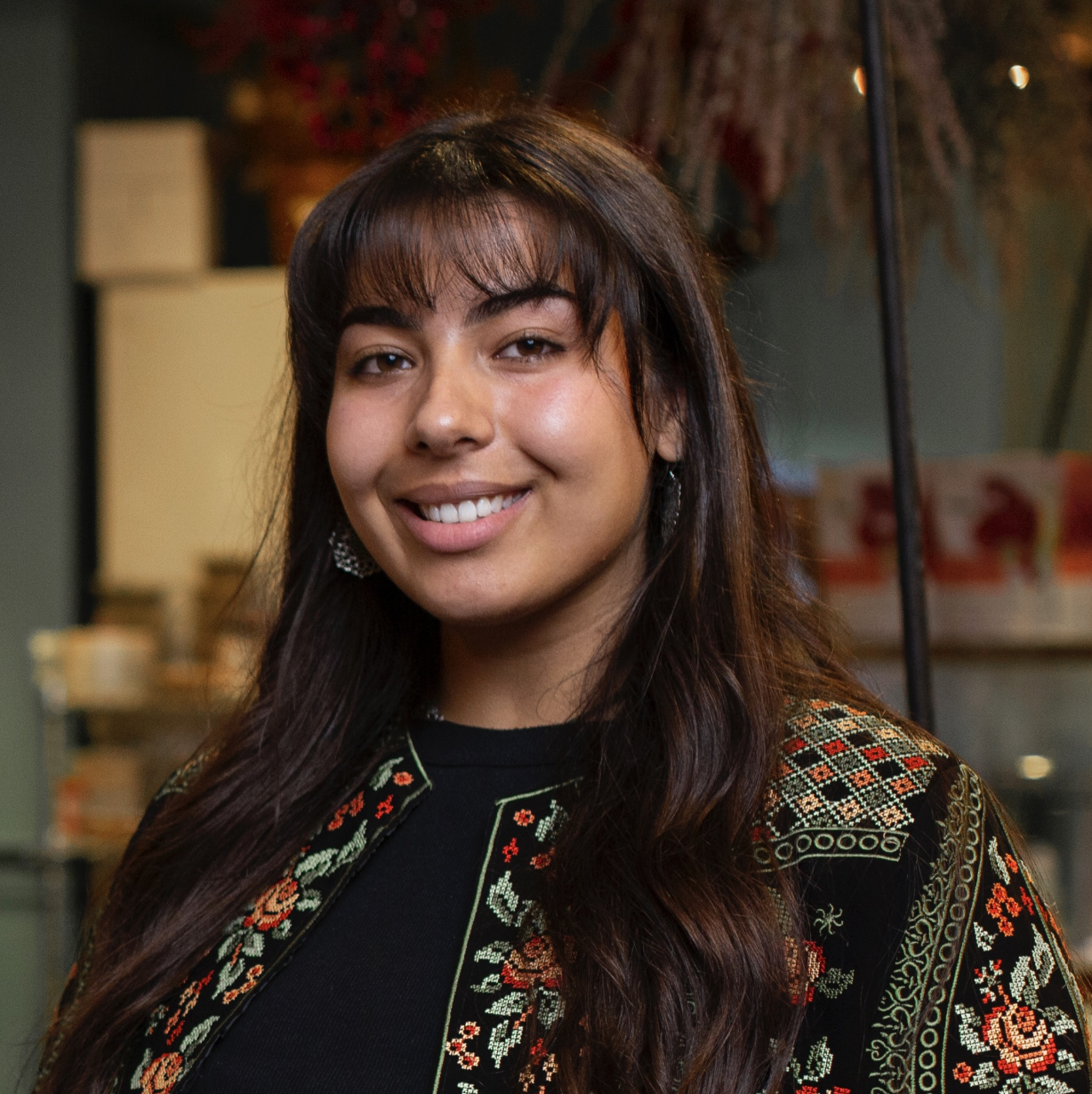Diversity Torch: Amina Darabie
April 9, 2024 - Emily Jodway
 Amina Darabie found herself at Michigan State the way that many in-state students do. She was surrounded by friends making the decision between attending MSU or the school down the road. But Amina’s situation ‘fell together nicely’ and she began her Spartan journey in the fall of 2019.
Amina Darabie found herself at Michigan State the way that many in-state students do. She was surrounded by friends making the decision between attending MSU or the school down the road. But Amina’s situation ‘fell together nicely’ and she began her Spartan journey in the fall of 2019.
Amina was excited to experience firsthand all that Michigan State offers, but academically, she was unsure about where she was headed. It wasn’t until she was taking a required Integrative Studies in Social Science class that she found her path.
“I took a class, it was one where you could make your own documentary film on any topic you wanted,” she explained. “I was like, ‘wait, this is what school can look like?’ I really fell in love with classes talking about social theory, critical studies and global studies.”
Amina made the decision to major in Interdisciplinary Studies with minors in Arabic, experience architecture and graphic design, as she developed a passion for digital storytelling and visual design. Amina is an Arab-American whose family lives in Amman, Jordan; she holds dual citizenship in the US and Jordan. This greatly inspires her research interests surrounding intercultural education and cultural exchange. She has participated in several study abroad experiences, traveling to Jordan and Jaipur, India. Her current research project was influenced by her first-ever study abroad trip back to Amman.
“I was traveling to a place that I had been many times before, but I was traveling with a lot of students that have never left the country before, and getting to see my culture through the lens of my peers who were experiencing it for the first time was so interesting,” she said.
Once back in the US, Amina noticed in conversations with her peers that despite spending eight weeks together in the same place, everyone came away from the experience with vastly different opinions about Arab culture. She turned her attention to figuring out ways to encourage more nuanced perspectives and to combat the ‘flattening’ or generalization of cultures, in her case from a visual standpoint.
One example of this she saw was in poster advertisements for study abroad courses.
“There were a lot of pictures, for example, on a poster for India, you’ll almost always see an elephant,” she explained. “Or camels on a poster for Egypt; the sandy desert is also prominent for any trip to the Middle East. But not so much the faces and the people, which to me is the true culture, the true essence of wherever you’re traveling to.”
Amina also works to encourage more of an in-depth cultural exchange when studying abroad, and giving students the chance to really immerse themselves in another country’s culture, working directly in the community and engaging with locals. She is also passionate about removing barriers, like high cost, to make study abroad more accessible for everyone. She sees these trips as some of the most impactful experiences a student can have in college.
“I think maybe the most important thing that anyone can do is experience something outside of themselves, and tap into that empathy,” she said. “I’m realizing now that’s something that I’ve taken for granted living between cultures my entire life. I was always aware of it, but now I’ve seen how it can really change people and the trajectory of their life.”
Amina also emphasizes the need for cultural exchange not just abroad, but here in the US, and how important representation is for minority groups like Arab-Americans. Growing up she struggled to find this representation in her community, but once she came to Michigan State, she found people like her, and student organizations to join, and classes to take like Arabic, which helped her, as she described, “rediscover that part of me that was lost.”
“It’s so cool to have so many Muslim and Arab friends, and professors too,” she said. “My ultimate goal is to become an educator, and for the longest time I had never had a teacher that was an Arab woman, and it’s so great to see that representation.”
When asked about ways that colleges can encourage this representation and expand opportunities for marginalized groups on campus, she emphasized the importance of inclusive language, as well as spaces on campus for multicultural groups to meet. Another is making students feel comfortable expressing themselves. “Free speech is really important,” she explained. “Just making sure that we feel the administration values our voice and that we are protected.”
This, along with celebrating and organizing activities during times like Arab American History Month, are just some of the many ways to ensure that these groups can feel recognized and respected.
“I think it’s so important to bring attention to all the great work Arab Americans are doing, whether it’s in politics, filmmaking, academia, poetry…” Amina said. “Any time it can be brought up and these achievements are talked about is important, and can combat a lot of prejudice or biases that exist for Arabs in America by seeing all the great things that we’re doing.”
Honorees’ views are their own and do not necessarily reflect those of the College of Social Science.

